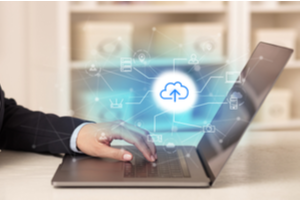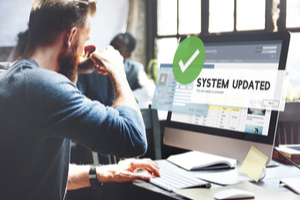When your business started, desktop accounting software (DAS) might have been the ideal solution. The leading applications seemed powerful, especially compared to old-school accounting: sales receipts, pencil sharpeners, hand-held calculators.
As technology and accounting software have evolved, more applications have migrated to the cloud. And for good reason.
As Zach Lanich writes in Forbes, cloud-based software applications have increased security, they update automatically, and they save companies a lot of money.
Cloud accounting software has all of those advantages but can do so much more for your organization’s financial management.
Breaking the chains of your desktop software
Let’s face it: desktop accounting software tethers you to one place, on one device, at one time. With an increased business atmosphere of collaboration, accessibility, and speed, it doesn’t benefit you to be limited by a desktop application.
There are plenty of reasons to move your accounting operations to the cloud. To fully understand them, let’s examine the most common problems accounting departments face with desktop software. Then we can see how the cloud solves them.
Exporting time

Users of desktop accounting software (reader: you may be one of them) are consistently frustrated with reporting time. Some DAS applications use front-end exporting, which means you have to wait until their report exports before it can be 100% complete.
What should take seconds ends up costing your accounting department over 30 minutes. That’s 30 minutes per report.
Desktop software’s speed is also often dependent on the amount of financial data you’re trying to export. It’s enough to frustrate any business with robust accounting records.
Fortunately, cloud accounting software reports in seconds. Because it’s web-based, it uses back-end exporting. That means it exports reports “behind the scenes.” The result? Reports happen almost instantly.
In the cloud, reports also load in real time, allowing you to continue doing your job, rather than losing time and resources waiting.
CPA Access
Because DAS is hosted on your hard drive, it only allows for one user to access it at a time. (This counts for remote users, too.) If your CPA needs access to company data, you’ll probably end up with a multi-step process, including exports and relaying information either by email or snail mail.
If that export takes 30 minutes, you’re wasting an employee’s time just so your CPA can view the data in the first place.
With cloud accounting software that’s hosted on a remote server and browser-friendly, CPAs can access your accounting system anywhere, at any time. Unlike on your desktop, when your CPA uses the system, you don’t get kicked out.
Even better, CPAs can run reports and export them all on their own, directly from within the system. All you need to do is grant them access.
Transparency
Users of desktop accounting software have to work on different computers, each with separate hard drives. That means users outside of those computers can’t see any financial data. Instead, they’ll need to rely on the (slow) reports exported from the system.
DAS tools are also limited: they don’t allow you to see granular details about, for example, report and transaction totals.
Cloud-based accounting software provides much more access and transparency across your entire organization. With a complete business management system, all of your employees can not only access accounting details simultaneously, but they can also communicate using the system. That way, your company keeps information centralized and continually accessible.
A complete management software application with full financial management tools also allows you to access more data points that might be related to, but not be derived from, a traditional accounting system. That information could include sales data, marketing budgets, payments on a customer portal, or payroll data. If your accounting department can easily get access to company-wide information, they’ll work much more efficiently.
Mobile access

According to a recent study by IWG (International Workspace Group), telecommuting is on the rise—and remote access to software is more important than ever. They report that: 70% of professionals work remotely one day a week; 53% work remotely for at least half the work week; 11% work remotely all week long.
Because you can only access desktop accounting software using the computer you’ve installed it on, you’ll have to purchase a license per-computer in order for others to access it.
If your accounting department has remote workers or employees who travel, they’ll have to bring their computer wherever they go. (In this scenario, hope they’ve downloaded the software onto a laptop.)
If they don’t bring a computer, or if they experience any technical difficulties, they’ll need to contact someone who has a licensed computer just to enter simple financial records.
Cloud-based accounting software, on the other hand, is accessible on any device at any time. It’s perfect for remote workers, CPAs, and traveling accountants.
Some cloud-based software products have their own apps; some don’t. Any cloud accounting software you try should at least be optimized for views on desktop, mobile, and tablet.
Data security
With desktop accounting software, you have to perform backups manually to ensure your data is secure. But if something happens to the computer your software is installed on— if it’s damaged, lost, or stolen— you’ll also lose and compromise your data.
Keep in mind that it’s not just “data” we’re talking about. Those are your financial records. It’s painful to think about what that kind of loss can do to a business. Even options for data recovery can be time-consuming, and they’re not guaranteed to work.
There’s also a speed issue here: desktop software is only as fast and secure as the computer it’s installed on. A slow and unsecured computer equals a slow and at-risk software application.
Cloud accounting software is backed up on remote servers, 24 hours a day. In the cloud, your data is also backed up in real-time. Should your desktop computer be compromised in any way, your data is not only protected, but you can also still access it from any other device.
Cloud-based software has an added speed bonus, too. Since your financial data isn’t being stored on a hard drive, everything you do in the system will happen much faster.
Updates
Most desktop software only offers updates once per year. That means no new features and no resolutions to problems unless the vendor issues an intermittent bug fix. Not only do these updates occur sparingly, but users sometimes have to pay to unlock them and then download the update on their licensed computer.
Worse, users are typically locked out of the software until the update is fully downloaded. If you’ve ever waited for one of these to happen, you know just how frustrating it can be. Especially when you’re trying to get work done.
By contrast, most cloud accounting software automatically updates every 3-6 weeks. With a truly robust software, that means you get access to approximately 8-17 new features per year, as opposed to the paltry few on the desktop.

With every update, your system unlocks new functionality and resolves bugs. And because updates occur for only an hour on off-hours and on weekends, you shouldn’t experience any disruption to your workday.
Truly advanced cloud accounting software will even update in the background of your application, so if you happen to be working during an update, you’ll still have read-only access to all of your financial data for that hour.
Double entry
Most desktop accounting software offers limited integration opportunities. Most of the time, companies who use multiple systems need to replicate data in every system just to maintain accuracy.
Double entry means double the effort.
However, if you have a fully integrated cloud accounting solution, you can eliminate double-entry altogether. By pulling in data from your sales, human resources, and project divisions, you’ll already have the information handy.
Some systems accomplish this type of connection through integrations and APIs. But it’s also possible, and preferable, to have a single system that connects your data. That means no signing in and out of separate applications. For your accounting department, it means no twisting arms to access information from other divisions.
A complete management solution
At this point, you might be wondering: can my desktop accounting software just integrate with an ERP or other business management software?
It can. But that’s like plugging your vacuum cleaner into a wall socket that keeps shorting out.
Rather than ignoring the shortcomings of desktop software (which will only become greater with time, as they become legacy products), moving to a fully integrated cloud solution will provide greater accessibility for more robust financial management.
Conclusion
Desktop accounting software applications are going the way of the dinosaurs. Applications that run in the cloud provide not only more data security, but a whole host of process features that make your accounting much easier. And faster.
It’s no longer a question of whether you should consider a cloud solution— it’s a question of when.
When looking for a cloud solution, make sure it can completely integrate with your other company data. Just because an application exists in the cloud doesn’t necessarily mean it does everything you need it to.
With the right vendor and features, you’ll be able to completely streamline all of your accounting processes, for now, and for the future.

